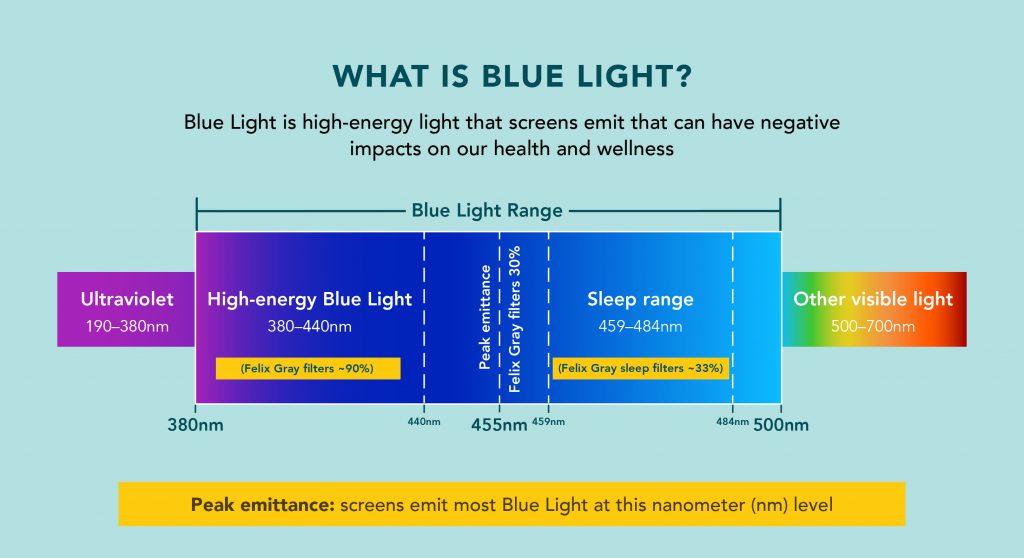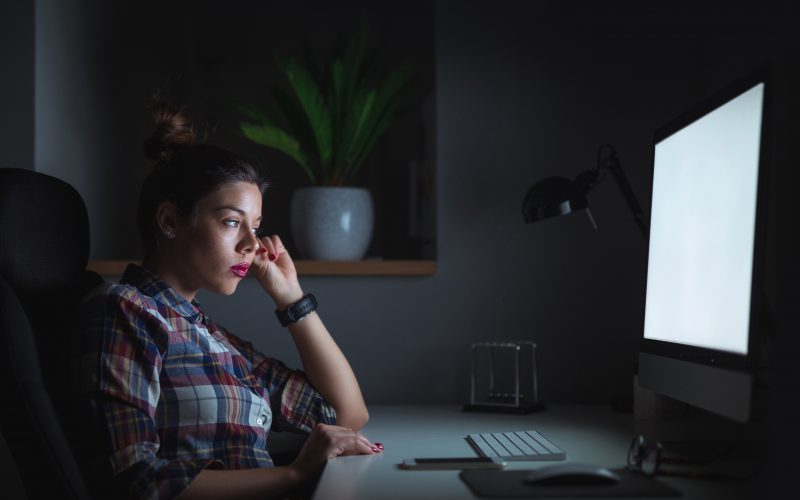Blue Light is everywhere in today’s screen-filled world. It can have many effects on your day-to-day activities, which is why so many people wonder how to protect your eyes from screens.

To protect eyes from Blue Light, there are many different technologies out there that will filter Blue Light for you. However, not all Blue Light filtering technology is created equally. We’re walking you through 5 main ways to filter Blue Light and breaking down the pros and cons of each solution.
1. Blue Light lens coatings
Pros: Glasses that use Blue Light coatings are often less expensive options since they’re made out of a cheaper material.
Cons: Many coatings don’t filter a meaningful range of the Blue Light that actually comes off electronic devices. Plus, the lenses are highly reflective (which can be distracting to you and others), and they often have a blue tint, which can be unsightly. Over time, coatings can also scratch or wear off, which makes them even less effective. This is why coatings aren’t the best option for those wondering how to protect your eyes from computer rays.
2. Tinted Lenses
Pros: Tinted lenses are often an effective solution to filter meaningful amounts of Blue Light. They will not lose their effectiveness as the yellow lens is what filters the Blue Light. They can be a good solution when you’re wondering how to protect my eyes from mobile devices, laptops, and desktop screens.
Cons: Since there’s a lens tint, colors will appear distorted, and not everyone feels comfortable wearing glasses with yellow lenses to work or when they’re out and about. It is not the best option for people who are looking for a more fashion-friendly or professional option.
3. Embedded Blue Light filter lens
Pros: Embedding Blue Light filtering technology directly in the lens is the most effective way to protect your eyes. That’s why we here at Felix Gray essentially invented this type of solution with lenses that filter almost 90% of high-energy Blue Light, eliminate 99% of glare, and won’t distort your color perception. They also look great!
Cons: While lenses with embedded Blue Light filtering technology are the most effective solution, they tend to cost slightly more due to the intricate process of its engineering technology. However, they are worth the price for the awesome technology used in them that provides eye protection against Blue Light.
4. Night Shift or F.lux
Pros: For those wondering how to protect eyes from a mobile phone, apps like Night Shift and F.lux can help make it easier on your eyes at night. By turning your screen red, they reduce the amount of Blue Light on your screen. They are simple ways to reduce the strain on your eyes caused by Blue Light.
Cons: Unless your screen is completely red, then you still have Blue Light being emitted, which suppresses your melatonin secretion. These apps also don’t protect against glare, which also causes eye strain. Oftentimes these apps are great to use in conjunction with Blue Light filtering glasses like the ones sold at Felix Gray. In all, these apps alone are not the answer to the question, “how can I protect my eyes from phone screen.”
5. Avoiding technology
Pros: Removing technology altogether is a highly effective way of eliminating Blue Light. If you’re not looking at a screen, then you can’t experience symptoms of Digital Eye Strain.
Cons: It’s the modern world, and screens are everywhere. It can be incredibly challenging to totally disconnect in today’s world, but hey, kudos to you if you can!
Overall, there are many ways on how to protect eyes from Blue Light, and there are pros and cons to each solution. The bottom line is that in today’s world, there is a need for laptop, television, and cell phone eye protection, whatever form it may come in. If you’ve ever wondered how to protect your eyes from a mobile screen or computer, this article outlined some of the best options for you.
